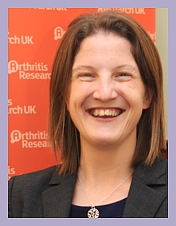 by Dr. Alan Nye, President Primary Care Rheumatology Society, Executive Director, Pennine MSK Partnership Ltd.
by Dr. Alan Nye, President Primary Care Rheumatology Society, Executive Director, Pennine MSK Partnership Ltd.
This is my final month as President of the Primary Care Rheumatology Society and it’s been a very interesting 2 years for me. I apologise that this blog is England-centric, but England is the totality of my NHS experience and I cannot write about areas outside of my experience. I would like to cover, albeit briefly, three areas that over the past few years have become very dear to my heart:
- MSK training for primary care
- MSK networks and commissioning MSK services
- Shared decision-making
For a long time the lack of training for front line GPs has been a real issue for the NHS.…
Read more of this article



 by Laura Boothman, Policy Manager at Arthritis Research UK
by Laura Boothman, Policy Manager at Arthritis Research UK
 by Dr Adam Al-Kashi, Head of Research & Education, BackCare
by Dr Adam Al-Kashi, Head of Research & Education, BackCare
 by Jann Landles, Hon Secretary, Vasculitis UK
by Jann Landles, Hon Secretary, Vasculitis UK
 by Chloe Kastoryano, Project Coordinator, Scleroderma Society
by Chloe Kastoryano, Project Coordinator, Scleroderma Society
 by Maurice Cheng, Chief Executive of The Institute of Osteopathy I’m sitting here on a Sunday morning writing this blog post, having missed the deadline, wondering what I could reflect on that would be interesting for ARMA colleagues. The reason I’m late with this is because we’ve just relaunched the British Osteopathic Association as the
by Maurice Cheng, Chief Executive of The Institute of Osteopathy I’m sitting here on a Sunday morning writing this blog post, having missed the deadline, wondering what I could reflect on that would be interesting for ARMA colleagues. The reason I’m late with this is because we’ve just relaunched the British Osteopathic Association as the 
 by Judi Rhys, Chief Executive of Arthritis Care I recently attended a plenary session at the European Federation of National Associations of Orthopaedics and Traumatology Congress. The presentations were concerned with the ‘global musculoskeletal challenge’ and the ‘imminent avalanche of demand’ ahead. Many of the speakers referred to the rise in worldwide obesity and the link between obesity and osteoarthritis. A review of research in this area suggests an obese person is 14 times more likely to develop knee osteoarthritis, compared with a person of normal weight.…
by Judi Rhys, Chief Executive of Arthritis Care I recently attended a plenary session at the European Federation of National Associations of Orthopaedics and Traumatology Congress. The presentations were concerned with the ‘global musculoskeletal challenge’ and the ‘imminent avalanche of demand’ ahead. Many of the speakers referred to the rise in worldwide obesity and the link between obesity and osteoarthritis. A review of research in this area suggests an obese person is 14 times more likely to develop knee osteoarthritis, compared with a person of normal weight.… 
 by Chris Maker, Director of LUPUS UK One of the biggest problems for people who have lupus is obtaining a diagnosis. During 2009 LUPUS UK posted a survey questionnaire to all 5,700 members asking them to provide information about how lupus impacts on their lives. The response was overwhelming with over 3,000 completed questionnaires being returned. The summary of findings was:
by Chris Maker, Director of LUPUS UK One of the biggest problems for people who have lupus is obtaining a diagnosis. During 2009 LUPUS UK posted a survey questionnaire to all 5,700 members asking them to provide information about how lupus impacts on their lives. The response was overwhelming with over 3,000 completed questionnaires being returned. The summary of findings was:
 by Sue Browning, Deputy CEO, Chartered Society of Physiotherapy
by Sue Browning, Deputy CEO, Chartered Society of Physiotherapy
 by Nick Pahl, CEO of the British Acupuncture Council
by Nick Pahl, CEO of the British Acupuncture Council